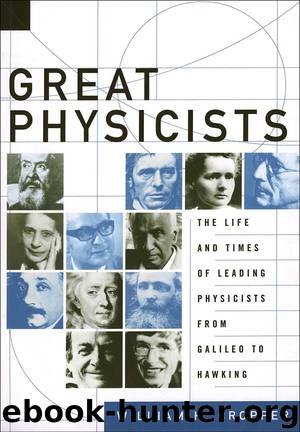Great Physicists by William H. Cropper

Author:William H. Cropper
Language: eng
Format: azw3
Publisher: Oxford University Press
Published: 2007-08-15T07:00:00+00:00
Wunderkind
Werner Heisenberg, whose skill in the delivery of far-reaching theories brought matrix mechanics into the world (a few months before Schrödinger attended the birth of wave mechanics), was born in Würzburg, Germany, late in 1901. At the time, Werner’s father, August, taught ancient languages at the Altes Gymnasium in Würzburg. According to David Cassidy, Heisenberg’s most recent biographer, “August Heisenberg is remembered by his family, superiors, and pupils as a rather stiff, tightly controlled, authoritarian figure. A former student recalled that the schoolmaster demanded ‘unbending fulfillment of duty, absolute self-control, and meticulous precision.’” Heisenberg’s mother, Annie, was attuned to life in a household that centered on her husband’s career. With little assistance, she cared for her two sons and kept her house in fine order. Her formal education was limited—women were excluded from German universities at the time—but advanced enough through self-education and instruction from her father (the rector of a prestigious gymnasium in Munich) for her to add grading of student homework to her many other chores. August Heisenberg was no less driven in his working habits. He carried a course load that many present-day teachers would consider inhuman, participated extensively in political affairs relating to education, and produced a vast scholarly output. His efforts were rewarded. In 1910, he was appointed to the important chair of Greek philology at the University of Munich.
Heisenberg grew up in a family atmosphere that was comfortable but not always secure. One sign of psychological tension was a furious rivalry between Werner and his older brother Erwin, “stoked by August,” writes Cassidy. “As boys [Cassidy continues], the two often fought fierce battles with each other. As they grew older, they fought even more frequently and intensely. Finally, after one particularly bloody battle—in which they beat each other with wooden chairs—they called a truce and went their separate ways. After that, they had little to do with each other, except for occasional family visits as adults.”
During the formative years of Heisenberg’s adolescence, Europe was torn by World War I. In the political and economic chaos that followed the war, Germans young and old were adrift and desperate. “The reins of power had fallen from the hands of a deeply disillusioned older generation,” Heisenberg writes in his autobiography, “and the younger one drew together in an attempt to blaze new paths, or at least to discover a new star by which they could guide their steps in the prevailing darkness.” Heisenberg found his guiding star in the romantic ideals of the youth movement called the Deutscher Neupfadfinder (German New Boy Scouts). He became the leader of a group of younger boys, who were intimate friends for the rest of his life. They hiked, climbed, camped, and earnestly debated Germany’s future.
August Heisenberg contributed to his son’s scientific education by introducing him to the speculations of the Greek philosopher-scientists, and the boy found the scientific writings of the Greeks more believable than his textbooks, with their bizarre pictures of molecules containing bonds illustrated with hooks and eyes.
Download
This site does not store any files on its server. We only index and link to content provided by other sites. Please contact the content providers to delete copyright contents if any and email us, we'll remove relevant links or contents immediately.
The Complete Stick Figure Physics Tutorials by Allen Sarah(7359)
Secrets of Antigravity Propulsion: Tesla, UFOs, and Classified Aerospace Technology by Ph.D. Paul A. Laviolette(5361)
Thing Explainer by Randall Munroe(3927)
The River of Consciousness by Oliver Sacks(3590)
The Order of Time by Carlo Rovelli(3178)
How To by Randall Munroe(3098)
A Brief History of Time by Stephen Hawking(3013)
I Live in the Future & Here's How It Works by Nick Bilton(2977)
What If?: Serious Scientific Answers to Absurd Hypothetical Questions by Randall Munroe(2691)
The Great Unknown by Marcus du Sautoy(2683)
Midnight in Chernobyl by Adam Higginbotham(2531)
Blockchain: Ultimate Step By Step Guide To Understanding Blockchain Technology, Bitcoin Creation, and the future of Money (Novice to Expert) by Keizer Söze(2477)
Networks: An Introduction by Newman Mark(2398)
The Meaning of it All by Richard Feynman(2338)
Easy Electronics by Charles Platt(2322)
The Tao of Physics by Fritjof Capra(2258)
Midnight in Chernobyl: The Untold Story of the World's Greatest Nuclear Disaster by Adam Higginbotham(2215)
Introducing Relativity by Bruce Bassett(2111)
When by Daniel H Pink(2109)
